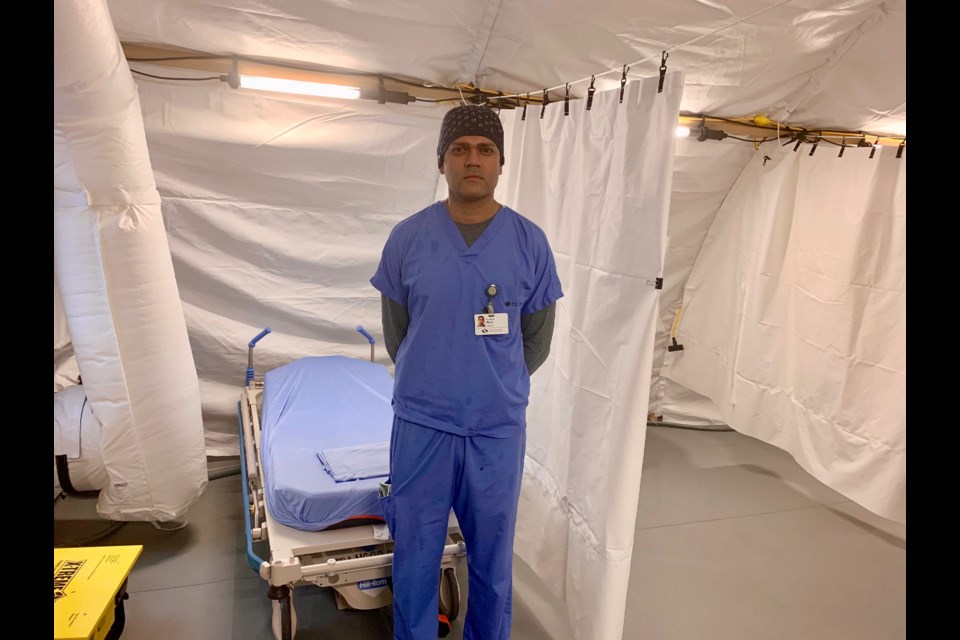Southlake Regional Health Centre is relocating its COVID-19 assessment centre to one of its newly installed medical field tents.
Until yesterday afternoon, the assessment centre has been located in the emergency department ambulance bays since its opening March 14 at the Newmarket hospital.
“As our volumes come up, we were just worried there would be some congestion with the increased number of ambulances, so we decided to move out here so that we could bring our patients here, safely assess them, get them tested if needed, while also keeping a safe distance between them,” Dr. Gaurav Puri, Southlake’s chief of emergency medicine.
The two medical field tents, which have been set up near the hospital’s east entrance driveway, are fully equipped with heating, air conditioning, power and are also capable of maintaining negative pressure, should the hospital require additional isolation facilities, according to Stephen Trafford, manager of emergency and disaster preparedness.
Southlake has the flexibility to repurpose the tents as the pandemic evolves, he said.
“We’re not at a stage — we’re very fortunate — where we have to move critically ill people into tents,” said Puri.
The tent has been set up to accommodate 10 pods with beds, separated by curtains.
The triage process remains unchanged, with patients first being screened and registered before parking and attending the assessment centre, where they will be seen by a nurse and doctor, who will determine if testing is required, Puri said.
Relocating the assessment centre outside of the hospital will reassure visitors to the emergency department that it is a safe environment, he added.
“We want to be able to provide not only testing but high-quality assessments for people who are coming in, and right now, every upper respiratory tract infection, every potential gastrointestinal-appearing viral infection, we’re going to presume that’s COVID until proven otherwise, so we’ve got to test those people,” he said.
“But we don’t want people who have other symptoms like headaches, chest pains, acute traumatic injuries to feel uncomfortable to get care in our main emergency department and that’s part of the reason that we’re (out) here, so these patients can get seen and assessed (without) fear of coming to the hospital and being exposed.”
The daily number of tests being done have increased significantly in recent weeks, from an average of 30 to 40 when it first opened, to more than a 100 most days last week, according to York Region public health.
The number of people attending the assessment centre itself has increased only slightly, Puri said.
Teams of physicians and nurses have been assisting long-term care, retirement and group homes with testing of all residents and staff, including Eagle Terrace, Bradford Valley, Mackenzie Place, Amica, and Sunrise, Puri said, which has helped contribute to the increased volumes.
“Some of the testing has gone up because we just know more about the virus,” he said. “Specifically what we know now is that the virus is present in people with minimal and no symptoms. And really, we’ve got to test people so that not only can we identify positive cases, but so we can mitigate their spread to other people.”
As well, more tests are available and the capacity to process them has increased, he added.
The tents, which can house up to 30 patients, were funded by donations by two community members.
“We’re all trying to predict what might happen in the pandemic, it’s difficult, as you know,” said Trafford. “So far the guidelines in place — the social distancing, the staying home — has certainly helped with preventing that massive surge in the emergency departments and we’re seeing the positive results.”
“Having said that, we have a responsibility as a hospital, as a community, to be prepared should that change.“
Trafford said when the hospital began its pandemic planning in January, the mobile tents were selected as an option for additional capacity if required.
“Early on in the pandemic, we recognized we may need surge space, and specialized environments, depending on the type of patients we are receiving,” Trafford said. “The advantage to the shelters is even though right now we are using them as our assessment centre, we have the ability to quickly adapt them, depending on the operational demands.”
“So if we have a big demand of patients requiring simple testing, we can do that; if we required additional bed space, we can do that,” he added.
In the meantime, he said, “If you need us, come, we’ve created a safe environment within the hospital. There’s no more risk of contracting COVID-19 in here than in a grocery store — actually, it’s cleaner here, everybody here is wearing masks, and certainly anybody here who has COVID-19 is in masks.”
You can learn more about Southlake Foundation’s COVID-19 action fund here.


